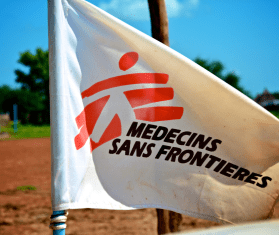Massive Mobilization of Aid Needed to Avert Deaths of Hundreds of Thousands
Luanda/New York, May 16, 2002 — A new exploratory mission conducted by the international humanitarian organization Doctors Without Borders/Médecins Sans Frontières (MSF) in Galangue, 47 kilometers to the south of Bunjei in Huila province, Angola, has revealed another famine-stricken region in which thousands of people are now close to death from starvation. Over the past two weeks, Galangue has served as a location for the demobilization of Unita troops and their families. These soldiers, who have been arriving at Galangue across the Cubango River, have brought with them an estimated additional 10,000 people.
"Not a day goes by without a woman sobbing for the child she just lost," says Thereza, a 20 year-old woman in Galangue.
The MSF team counted 31 freshly dug graves in two weeks and estimated the mortality rate to be 5 per 10,000 people per day (five times higher than the emergency threshold). The leading cause of mortality is acute malnutrition. MSF's rapid nutritional survey, conducted among 538 children under 5, indicates that more than one-fourth of children screened are suffering from severe malnutrition, and a further 18% are suffering from moderate malnutrition (42% global malnutrition). Four children died on the day that the MSF team was conducting its survey, and 188 people required urgent care (130 children under five, 50 children aged between 5 and 10, and eight adolescents and adults). A first group was immediately transported to Caala for emergency assistance, and others are being transported there by truck. The MSF feeding center at Caala is already providing care for 850 severely malnourished children.
In an effort to cope with this latest crisis, MSF has set up medical mobile teams in Galangue to deal with emergency cases and stabilization of patients prior to transfer. MSF will soon begin a food distribution for families with children under 10. In the space of a few weeks, MSF has opened emergency missions in locations throughout Angola, including at Bunjei, Chipindo, and Chilembo (Huambo and Huila provinces), Damba (Malange province), Menongue (Cuando Cubango province), Chitembo (Bié province), Camacupa, and Kuito, to provide medical care to people who are close to death.
Since March, MSF teams working in newly accessible region of Angola have found tens of thousands of starving people. Trapped in regions formerly disputed by the warring parties, they have had no access to humanitarian assistance for many years. Held hostage by each of the warring parties in turn, they have for the past three years been living in a state of slavery. They have been displaced, either by force or by threat of force, and their villages and homes have often been burned down. A constant pattern of attack and reprisal and systematic plundering have prevented them from growing or harvesting their crops, depriving them of basic resources and condemning them to a life of misery. Without a general food distribution and immediate, massive mobilization by the authorities and by humanitarian agencies, hundreds of thousands of people may soon die.
In an effort to deal with the current nutritional crisis in Angola, MSF has tripled its personnel in these regions. Present in Angola since 1983, MSF currently has over 150 international and more than 1,000 local employees working in eleven of the country's 18 provinces.



